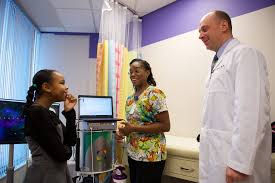
A medical researcher conducts research which helps hospitals, physicians, and manufacturers to improve the quality of life for people. Scientists use their analytical skills and curiosity to develop new treatments and find the root cause of disease.
How to Become A Medical Scientist
You must possess a higher degree in the field of science before you can become a physician scientist. You can earn a Bachelor's Degree in Biology, Chemistry, or any other science discipline, and then enroll in a Ph.D. program. According to your career goal, you may choose to specialize in a particular area of medical science. You might decide to specialize in pathology or genetics. This can make you stand out when it comes to medical research.
You may work as an independent researcher, or you might be part of a team of scientists. In order to effectively communicate your findings with non-scientists, you'll need excellent communication skills. In the private sector, you might need to explain your research plans or results in order to convince business managers or technicians that your ideas will be profitable.

What do Medical Scientists Earn?
According to Bureau of Labor Statistics data, medical scientists' median annual wages in May 2020 was $95,310. The lowest 10% of medical scientists made less than $50,000, while the highest 10% earned more than $166.980.
The growth of employment for medical scientists from 2020 to 2030 is expected to be 17 percent higher than the national average. About 12,600 openings are projected each year on average over that decade. The majority of these openings will result from workers leaving the workforce or transferring into other occupations.
What is Medical Researcher?
A medical researcher is a scientist who conducts medical research in a laboratory, with other scientists' help. The researchers work with viruses, human tissues and organs in order to learn how different components of the organism interact, as well as how to treat a disease. Some medical researchers study how pharmaceuticals can be used to treat or prevent illness, while others work on projects that examine the causes of disease.
What are the career requirements?
You need to have a bachelor's degree in a science field and have excellent grades throughout your educational career. You should also be well-versed in mathematics, as this can help you with data analysis, which is important for analyzing and interpreting data from medical research.

For a medical science career, you will need a graduate degree, some experience working with other scientists, as well as writing and communication abilities to effectively communicate your findings. Most employers seek applicants with experience as a scientific researcher or as a research associate, as well as those who have published in scientific journals.
You can get a job in a nonprofit or university as a scientist. You can work in a team or independently, but you must be able speak and write clearly. In the private industry, your job might be to develop medical products or work as part a clinical team. You may also provide medical advice and guidance to physicians. Your duties as a medical scientist are to conduct research, collect samples, and analyze results. You can write grant proposals and reports to convince others of the value of your research.
FAQ
Who owns the healthcare network?
It all depends on your perspective. The government might own public hospitals. Private companies may run private hospitals. Or a combination of both.
What are the different types and benefits of health insurance
There are three main types:
-
Private health insurance covers most of the costs associated with your medical treatment. You pay monthly premiums for this type of insurance, which is usually purchased directly from private firms.
-
Although public health insurance covers the majority of the cost for medical care, there are some restrictions and limits. Public insurance does not cover preventive services, routine visits to doctors, hospitals and labs, Xray equipment, dental offices, prescription drugs or certain tests.
-
For future medical expenses, medical savings accounts are used. The funds are held in an account that is distinct from all other types of accounts. Most employers offer MSA program. These accounts do not have to be taxed and can earn interest at the same rate as bank savings.
What are medical systems?
Medical systems are designed for people to live longer and healthier lives. They make sure that patients receive the best possible care whenever they require it.
They ensure that the right treatment is given at the correct time. They also give information that allows doctors to provide the best possible advice to each patient.
Statistics
- Foreign investment in hospitals—up to 70% ownership- has been encouraged as an incentive for privatization. (en.wikipedia.org)
- The healthcare sector is one of the largest and most complex in the U.S. economy, accounting for 18% of gross domestic product (GDP) in 2020.1 (investopedia.com)
- Consuming over 10 percent of [3] (en.wikipedia.org)
- For instance, Chinese hospital charges tend toward 50% for drugs, another major percentage for equipment, and a small percentage for healthcare professional fees. (en.wikipedia.org)
- The health share of the Gross domestic product (GDP) is expected to continue its upward trend, reaching 19.9 percent of GDP by 2025. (en.wikipedia.org)
External Links
How To
What are the key segments of the healthcare industry?
The healthcare industry includes the following key segments: diagnostics/biotechnology, pharmaceuticals/diagnostics, therapeutics/health information technology, medical device, and equipment.
These medical devices include blood pressure monitors and defibrillators as well as stethoscopes and ultrasound machines. These products are typically used to diagnose, prevent, and treat diseases.
Pharmaceuticals are medicines prescribed to relieve symptoms or treat disease. These include antibiotics.
Diagnostics are laboratory tests used to detect illness and injury. There are many types of diagnostics: blood tests; urine samples; CT scans; MRI scans; X-rays.
Biotechnology is the use of living organisms, such as bacteria, to create useful substances that can then be applied to humans. You can find examples such as vaccines, insulin and enzymes.
Therapeutics refer to treatments given to patients to alleviate or treat symptoms. They can involve drugs, radiation therapy or surgical interventions.
Information technology for health is a category of computer software that helps physicians and their teams manage patient records. It helps doctors track what medications are being taken and when they should be taken.
Equipment used in the diagnosis, treatment, and monitoring of medical conditions or illnesses is called medical equipment. Dialysis machines are dialysis tables, pacemakers ventilators, operating rooms, and other medical equipment.